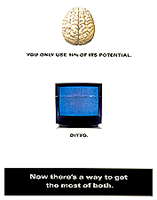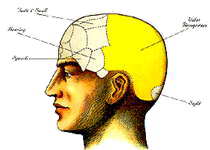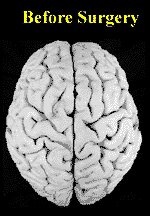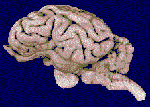Neuroscience For Kids
Do We Use Only 10% of Our Brains?
Let me state this very clearly:
There is no scientific evidence to suggest that we use only 10% of our brains.
Let's look at the possible origins of this "10% brain use" statement and the evidence that we use all of our brain.
Where Did the 10% Myth Begin?
 The 10% statement may
have been started with a misquote of Albert Einstein or the
misinterpretation of the work of Pierre Flourens in the 1800s. It may
have been William James who wrote in 1908: "We are making use of only a
small part of our possible mental and physical resources" (from The
Energies of Men, p. 12).
The 10% statement may
have been started with a misquote of Albert Einstein or the
misinterpretation of the work of Pierre Flourens in the 1800s. It may
have been William James who wrote in 1908: "We are making use of only a
small part of our possible mental and physical resources" (from The
Energies of Men, p. 12).  Perhaps it was the work of Karl Lashley in the 1920s and
1930s that started it. Lashley removed large areas of the cerebral cortex
in rats and found that these animals could still relearn specific tasks.
We now know that destruction of even small areas of the human brain
can have devastating effects on behavior.
That is one reason why neurosurgeons must carefully map the brain before
removing brain tissue during operations for epilepsy or brain tumors:
they want to make sure that essential areas of the brain are not
damaged.
Perhaps it was the work of Karl Lashley in the 1920s and
1930s that started it. Lashley removed large areas of the cerebral cortex
in rats and found that these animals could still relearn specific tasks.
We now know that destruction of even small areas of the human brain
can have devastating effects on behavior.
That is one reason why neurosurgeons must carefully map the brain before
removing brain tissue during operations for epilepsy or brain tumors:
they want to make sure that essential areas of the brain are not
damaged.
Advertisement for satellite TV. Text of the ad reads: "You only use 11% of its potential. Ditto. Now there's a way to get the most of both." --------------- Advertisement for Hard Disk  --------------- Advertisement for an Airline Text of the ad reads: "It's been said that we use a mere 10% of our brain capacity. If, however, you're flying **** from **** Airlines, you're using considerably more." 
|
Why Does the Myth Continue?Somehow, somewhere, someone started this myth and the popular media keep on repeating this false statement (see the figures). Soon, everyone believes the statement regardless of the evidence. I have not been able to track down the exact source of this myth, and I have never seen any scientific data to support it. According to the believers of this myth, if we used more of our brain, then we could perform super memory feats and have other fantastic mental abilities - maybe we could even move objects with a single thought. Again, I do not know of any data that would support any of this. What Does it Mean to Use Only 10% of Your Brain?What data were used to come up with the number - 10%? Does this mean that you would be just fine if 90% of your brain was removed? If the average human brain weighs 1,400 grams (about 3 lb) and 90% of it was removed, that would leave 140 grams (about 0.3 lb) of brain tissue. That's about the size of a sheep's brain. It is well known that damage to a relatively small area of the brain, such as that caused by a stroke, may cause devastating disabilities. Certain neurological disorders, such as Parkinson's Disease, also affect only specific areas of the brain. The damage caused by these conditions is far less than damage to 90% of the brain.
|
The Evidence (or lack of it)
 Perhaps when people use the 10% brain statement, they mean that only one
out of every ten nerve cells is essential or used at any one time? How
would such a measurement be made? Even if neurons are not firing action potentials, they may still be receiving signals
from other neurons.
Perhaps when people use the 10% brain statement, they mean that only one
out of every ten nerve cells is essential or used at any one time? How
would such a measurement be made? Even if neurons are not firing action potentials, they may still be receiving signals
from other neurons.
 Furthermore, from an
evolutionary point of view, it is unlikely that larger brains would have
developed if there was not an advantage. Certainly there are several
pathways that serve similar functions. For example, there are several
central pathways that are used for vision. This concept is called
"redundancy" and is found throughout the nervous system. Multiple
pathways for the same function may be a type of safety mechanism should
one of the pathways fail. Still, functional brain
imaging studies show that all parts of the brain function. Even
during sleep, the brain is active. The brain is
still being "used," it is just in a different active state.
Furthermore, from an
evolutionary point of view, it is unlikely that larger brains would have
developed if there was not an advantage. Certainly there are several
pathways that serve similar functions. For example, there are several
central pathways that are used for vision. This concept is called
"redundancy" and is found throughout the nervous system. Multiple
pathways for the same function may be a type of safety mechanism should
one of the pathways fail. Still, functional brain
imaging studies show that all parts of the brain function. Even
during sleep, the brain is active. The brain is
still being "used," it is just in a different active state.
 Finally, the saying "Use it or Lose It" seems to apply to the
nervous system. During development many new synapses are formed. In fact, some synapses are
eliminated later on in development. This period of synaptic development
and elimination goes on to "fine tune" the wiring of the nervous system.
Many studies have shown that if the input to a particular neural system is
eliminated, then neurons in this system will not function properly. This
has been shown quite dramatically in the visual system: complete loss of
vision will occur if visual information is prevented from stimulating the
eyes (and brain) early in development. It seems reasonable to suggest
that if 90% of the brain was not used, then many neural pathways would
degenerate. However, this does not seem to be the case. On the other
hand, the brains of young children are quite adaptable. The function of a
damaged brain area in a young brain can be taken over by remaining brain
tissue. There are incredible examples of such recovery in young children
who have had large portions of their brains removed to control seizures.
Such miraculous recovery after extensive brain surgery is very unusual in
adults.
Finally, the saying "Use it or Lose It" seems to apply to the
nervous system. During development many new synapses are formed. In fact, some synapses are
eliminated later on in development. This period of synaptic development
and elimination goes on to "fine tune" the wiring of the nervous system.
Many studies have shown that if the input to a particular neural system is
eliminated, then neurons in this system will not function properly. This
has been shown quite dramatically in the visual system: complete loss of
vision will occur if visual information is prevented from stimulating the
eyes (and brain) early in development. It seems reasonable to suggest
that if 90% of the brain was not used, then many neural pathways would
degenerate. However, this does not seem to be the case. On the other
hand, the brains of young children are quite adaptable. The function of a
damaged brain area in a young brain can be taken over by remaining brain
tissue. There are incredible examples of such recovery in young children
who have had large portions of their brains removed to control seizures.
Such miraculous recovery after extensive brain surgery is very unusual in
adults.
So next time you hear someone say that they only use 10% of their brain, you can set them straight. Tell them:
"We use 100% of our brains."
Several people have mentioned that the movie Lucy (2014) promotes the 10% of the brain myth. If you find any news articles or advertisements using the 10% myth, please send them to me: Dr. Eric H. Chudler.
For a continuing discussion of this topic, please see:
- The Ten-Percent Myth from the Skeptical Inquirer
- The Ten-Percent Myth
- Do People Use 10 Percent of Their Brains? - Scientific American
- The Life and Times of the 10% Neuromyth
- Humans use 100 percent of their brains--despite the popular myth - Ask a Scientist
- Higbee, K.L. and Clay, S.L., College students' beliefs in the ten-percent myth, Journal of Psychology, 132:469-476, 1998.
- B.L. Beyerstein, Whence Cometh the Myth that We Only Use 10% of Our Brains? in Mind Myths. Exploring Popular Assumptions about the Mind and Brain edited by S. Della Sala, Chichester: John Wiley and Sons, pages 3-24, 1999. This chapter is required reading for anyone who wants more information on the 10% myth.
| Did you know? | Dr. James W. Kalat, author of the textbook Biological Psychology, has another idea for the origin of the 10% myth. Dr. Kalat points out that neuroscientists in the 1930s knew about the existence of the large number of "local" neurons in the brain, but the only thing they knew about these cells is that they were small. The misunderstanding of the function of local neurons may have led to the 10% myth. (Reference: Kalat, J.W., Biological Psychology, sixth edition, Pacific Grove: Brooks/Cole Publishing Co., 1998, p. 43.) |
They said it! | "Myths which are believed in
tend to become true..." --- George Orwell (in The Collected Essays, Journalism, and Letters of George Orwell, vol. 3, edited by Sonia Orwell and Ian Angus, New York: Harcourt Brace Jovanovich, 1968, page 6.) "In fact, most of us use only about 10 percent of our brains, if
that." "Professor William James of Harvard used to say that the average
person develops only 10 percent of his latent mental ability." |
Copyright © 1996-2023, Eric H. Chudler All Rights Reserved.

